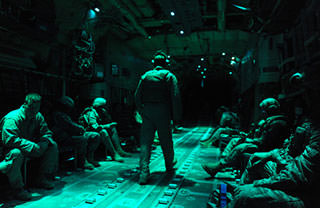Bad News for a Country Tired of War
Barack Obama’s plan for a limited withdrawal from Afghanistan means tens of thousands of American troops will remain there, many of them fighting, for several years to come.
Barack Obama’s plan for a limited withdrawal from Afghanistan means tens of thousands of American troops will remain there, many of them fighting, for several years to come.
In his speech Wednesday night, the president announced he will reduce the U.S. fighting force in Afghanistan by 10,000 by the end of this year and a total of 33,000 by September 2012. After that, he said, “our troops will be coming home at a steady pace as Afghan security forces move into the lead. Our mission will change from combat to support. By 2014, this process of transition will be complete. …”
Nowhere did he pledge that all the personnel would be brought home by that 2014 date.
Nor did he mention that 68,000 service personnel will remain in Afghanistan after September 2012. In addition, according to the Congressional Research Office, 18,919 “private security contractors” working for the Defense Department will also be serving in Afghanistan, performing duties seemingly indistinguishable from those done by American military personnel.
That means that after the pullout more than 86,000 personnel will remain engaged in fighting or the vague “support” duties cited by the president. They will add to the human and economic toll of a war that has killed, according to the website iCasualties, 1,632 American troops and wounded 11,191. The financial cost is now more than $426 billion. With the Iraq War added in, the figure reaches $1.2 trillion.
Although Obama’s speech was no cause for celebration, there were some pluses. The troop reduction was more substantial than the much smaller cuts advocated by outgoing Defense Secretary Robert Gates and the military command. Obama said the United States would negotiate with the Taliban if they “break from al-Qaida, abandon violence and abide by the Afghan constitution.” It’s doubtful that these conditions can be met, especially given the Taliban’s opposition to equal rights for women, part of the Afghan constitution. But at least we may be at the table with them.
Obama had a positive but not triumphal tone, saying the United States “is starting this drawdown from a position of strength.”
Actually, he is starting it from a position of weakness.
Although the war has been pretty much ignored by cable news and much of the rest of the mainstream media, apparently the American people have a different view. Around the country, local papers and television stations as well as NPR told the story of its human cost in interviews with survivors of dead servicemen and servicewomen and with stories about the wounded survivors.
Some media pundits say people don’t care, that the fighting by U.S. volunteers is remote to them. But those volunteers have families. And many of them are in the National Guard, pulled from home and jobs by repeated deployments to Afghanistan and Iraq. These National Guard women and men and their families, friends, neighbors and work colleagues make up a formidable network.
The latest poll by the Pew Research Center indicates how public opinion has changed. Fifty-six percent of those surveyed this month wanted us out of Afghanistan as soon as possible. That compares with 33 percent in a September 2008 Pew survey.
Then there’s the high unemployment that Obama has not been able to end. As he spoke, the figure was 9.1 percent. Among those who make up that percentage are a substantial number of long-term unemployed. Their travail, and that of their families, has resonated through cities and towns. Why, they ask, is the nation sacrificing young people and wasting money in Afghanistan when our own economy is suffering and we can’t find work?
These feelings have finally reached Washington and the political elite. Now Democrats and Republicans are drifting away from supporting the war or ignoring it.
That is why Obama adopted the rhetoric of war critics in his speech. “Over the last decade, we have spent a trillion dollars on war, at a time of rising debt and hard economic times,” he said. “Now we must invest in America’s greatest resource, our people. We must unleash innovation that creates new jobs and industry, while living within our means. We must rebuild our infrastructure and find new and clean sources of energy. … America, it is time to focus on nation building here at home.”
Rebuilding America means repairing freeways, constructing rail lines, restoring parks, adequately financing public schools, reducing home foreclosures, and assisting the cities and counties that have been forced to lay off workers ranging from police officers to trash collectors. And that’s just a start.
Obama needs to go beyond rhetoric. Keeping so many troops and “contractors” in Afghanistan through 2014 and beyond will not leave enough money to do what’s desperately needed at home. Bring them all back and put them and many others to work really rebuilding America.
Your support matters…Independent journalism is under threat and overshadowed by heavily funded mainstream media.
You can help level the playing field. Become a member.
Your tax-deductible contribution keeps us digging beneath the headlines to give you thought-provoking, investigative reporting and analysis that unearths what's really happening- without compromise.
Give today to support our courageous, independent journalists.






You need to be a supporter to comment.
There are currently no responses to this article.
Be the first to respond.